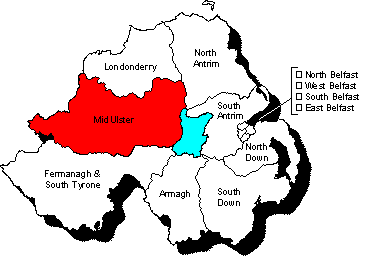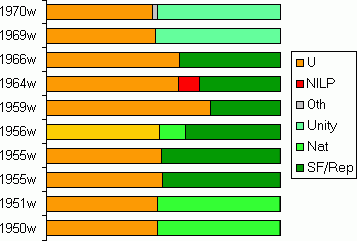

 |

|
|
|
|
|

|

|
| Map and diagram by Conal Kelly | |
This constituency located in the west of Northern Ireland, was established in 1948 and incorporated much of the old Fermanagh and Tyrone two-seat constituency, as well as the southern portion of county Londonderry. Between 1950 and 1970 the constituency was represented by five different MPs (1 Unionist/Ind U, 2 Nationalist, 1 Sinn Fein, 1 Unity). The longest serving of these was Unionist George Forrest who was first elected in 1956 and continued to represent the constituency until his death in 1968. All seven general elections held during this period were contested. Mid-Ulster also had three by-elections during this time. The constituency also recorded the highest turnout in 1970.
See also election results for Mid-Ulster 1973-1982, 1983-1992 and 1993-2007.
| U | Oth U | NILP | Oth | Nat | Unity | SF/Rep | |
| 1970w | 45.1% | 1.4% | 53.5% | ||||
| 1969w-b | 46.7% | 53.3% | |||||
| 1966w | 52.2% | 47.8% | |||||
| 1964w | 51.6% | 8.8% | 39.6% | ||||
| 1959w | 70.0% | 30.0% | |||||
| 1956w-b | 48.4% | 40.8% | |||||
| 1955w-b | 49.3% | 50.7% | |||||
| 1955w | 49.8% | 50.2% | |||||
| 1951w | 47.3% | 52.7% | |||||
| 1950w | 47.4% | 52.6% |
Unity majority: 5,929; electorate: 77,143; votes cast: 91.4%
Mid-Ulster returned to the polls only fourteen months after the last outing. Devlin's stature had grown in the interim and her participation in the 'Battle of the Bogside' had led to her arrest and conviction on incitement to riot. As a result Devlin served a short jail term. In the highest turnout of the election in Northern Ireland, Devlin increased her majority to just under 6,000 votes. Although elected under the 'Unity' banner, shortly after the election Devlin declared that she would sit in Parliament as an Independent Socialist.
Unity majority: 4,211; electorate 68,973; votes cast: 91.5%
George Forrest
who had represented Mid-Ulster since 1956, died in December 1968. In
the resulting by-election, the Unionist Party selected his widow,
Anna Forrest, as their candidate. On the nationalist side, the agreed
Unity candidate was Bernadette Devlin. Devlin, a psychology student at the Queens University of Belfast, had taken a prominent role in the People's
Democracy civil-rights organisation. She had also opposed James
Chichester-Clark in the Northern Ireland general election of 1969.
Anna Forrest, who apparently did not campaign, managed to poll only
300 votes less than her husband's 1966 tally. However Devlin was
able to rally the nationalist vote and topped the poll with a healthy
majority of 4,211 votes. At the age of 21, Devlin became the youngest MP at the
time and remains the youngest woman ever to have been elected to the British
Parliament.
One interesting side note on George Forrest is that he was an ardent
supporter of the embattled Prime Minister Terrence O'Neill. The
opposition to O'Neill's reforms was so strong that on the 12th of July 1967,
George Forrest was pulled from a platform in Coagh and kicked unconscious.
It is not believed that this incident played any role in his untimely
death.
Unionist majority: 2,560; electorate: 67,796; votes cast: 83.9%
The incumbent George Forrest again faced Thomas Mitchell, his long standing rival for Mid-Ulster. Mitchell improved his vote for the second election in row, taking 47.8% of the poll. However, he was still unable to unseat Forrest, who despite his reduced majority was declared the winner in Mid-Ulster for the fourth consecutive time. The constituency recorded the second highest turnout of the election in Northern Ireland.
Unionist majority: 6,905; electorate: 67,647; votes cast: 85.1%
Forrest and
Mitchell once again squared off in the 1964 general election. Sinn Fein
was now a proscribed organization so Mitchell contested the election
under the label ‘Republican’. The NILP also contested the election in
Mid-Ulster for the first and last time, losing their deposit in the
process.
In the end Mitchell saw his vote recover from the poor performance of
1959 but he was still unable to attract sufficient numbers to dislodge
Forrest, who went on to win his third consecutive election.
Thomas Mitchell (Tomas Misteil) again stood unsuccessfully for the Dail in the
1961 general election for the constituency of Dublin North-East.
Unionist majority: 18,923; electorate: 66,607; votes cast: 71.0%
Mitchell once again
contested the seat he had won twice in 1955. George Forrest the incumbent
MP also contested the election, however this time under the Unionist Party
banner. Despite being the sole nationalist candidate (unlike 1956), Mitchell
was roundly defeated by Forrest who increased his majority to almost
19,000. Although their best result of the election, Mid-Ulster was a
stark example of how the Sinn Fein vote fell right across Northern Ireland,
as a result of the IRA's divisive Operation Harvest campaign.
George Forrest stood unsuccessfully for the Northern Ireland House of Commons
in the 1958 general election for the constituency of East Tyrone. Thomas
Mitchell (Tomas Misteil) also stood unsuccessfully for the Dail in the
1957 general election for the constituency of Dublin North-East.
Unionist majority: 4,481; electorate 66,891; votes cast: 88.4%
Following the
August by-election, Mitchell was again disqualified on petition to
the Northern Ireland High Court due to his imprisonment and on the 7th
of October 1955 Beattie was declared elected in his place (although he
didn't take his seat). On further petition to a House of Commons Select
Committee, it was ruled on the 7th of February 1956 that Beattie was
disqualified for holding "offices of profit under the Crown" (membership
of national insurance and national assistance tribunals). A second writ
was issued for a by election on the 8th of May 1956.
Once again Mitchell contested the election, however the participation
of Nationalist Party candidate and former MP Michael O'Neill, ensured a
split in the nationalist vote. The Unionist Party stood aside in favour
of Independent Unionist George Forrest. Forrest, the winner with a
majority of 4,481, would later join the Unionist Party.
Sinn Fein majority: 806; electorate 66,847; votes cast: 89.7%
Having won the mid-Ulster seat in May, Mitchell was subsequently declared ineligible due to his imprisonment and the result was nullified. A new writ was issued for a by election that was held on 11 August 1955. The participants and the result were the same, with Mitchell increasing his majority over Beattie to 806.
Sinn Fein majority: 260; electorate: 66,847; votes cast: 88.6%
This election
came at a time of increased militant republican activity. In October
1954 the IRA had attempted a raid on Omagh Barracks in order to capture
weapons for their planned Operation Harvest. The raid was a failure and
led to the capture of eight IRA members. One of those captured and
imprisoned for his part in the raid was Thomas Mitchell. Mitchell was
subsequently selected to represent Sinn Fein in Mid-Ulster.
Unopposed on the nationalist side, Mitchell topped the poll in one of the
closest races on the election. Only 260 votes separated Mitchell from
his Unionist rival, a fact that perhaps indicates a level of discomfort
on the part of some nationalist voters in electing a convicted IRA member.
Mitchell was one of two Sinn Fein candidates elected in 1951, the other
being Philip Clarke in Fermanagh & South Tyrone. This was the first time
since 1918 that any Sinn Féin candidate had been elected to Westminster.
Nationalist majority: 3,393; electorate: 68,412; votes cast: 91.8%
The incumbent Anthony Mulvey, who had represented much of the area since 1935, retired and did not contest the election. In another close result, his successor Michael O'Neill retained the seat for the Nationalists. In fact the result was almost identical to that of 1950, with the nationalist candidate gaining an additional 71 votes and the Unionist losing 20. Mid-Ulster recorded the second highest turnout of the election in Northern Ireland.
Nationalist majority: 3,302; electorate: 68,535; votes cast: 91.6%
This was the first election fought in the new Mid-Ulster constituency and was one of the closer results in the 1950 general election in Northern Ireland. Recording the second highest turnout of the election, the result was a narrow win for the Nationalist incumbent Anthony Mulvey. Mulvey, a local newspaper editor, was first elected in 1935 and then again in 1945 for the two-seat Fermanagh and Tyrone constituency. This election saw the elimination of the two-seat constituency which was replaced by Mid-Ulster and Fermanagh & South Tyrone. Mulvey, who had previously been elected on an abstentionist ticket, would ultimately take up his seat at Westminster following this election (however briefly).
See also:
Results from 1950 to 1970 for each seat: East Belfast | North Belfast | South Belfast | West Belfast | North Antrim | South Antrim | Armagh | North Down | South Down | Fermanagh and South Tyrone | Londonderry | Mid Ulster
Other sites based at ARK: ORB (Online Research Bank) | CAIN (Conflict Archive on the INternet) | Northern Ireland Life and Times Survey
Your comments, please! Send an email to me at nicholas.whyte@gmail.com.
Conal Kelly, 1 June 2007.
|
Disclaimer:©
Nicholas Whyte 1998-2004 Last Updated on Wednesday, 12-Jan-2005 12:12
|